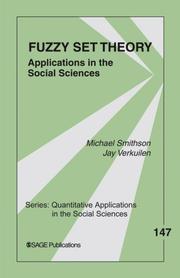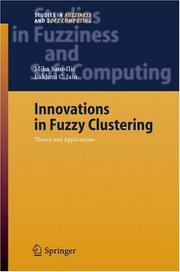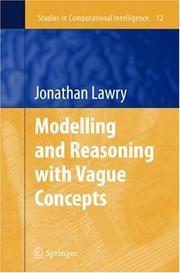| Listing 1 - 4 of 4 |
Sort by
|

ISBN: 076192986X 9780761929864 1412984300 1441628169 1452212414 Year: 2006 Volume: 147 Publisher: Thousand Oaks Sage
Abstract | Keywords | Export | Availability | Bookmark
 Loading...
Loading...Choose an application
- Reference Manager
- EndNote
- RefWorks (Direct export to RefWorks)
This book introduces fuzzy set theory to social science researchers. Fuzzy sets are categories with blurred boundaries. With classical sets, objects are either in the set or not, but objects can belong partially to more than one fuzzy set at a time. Many concepts in the social sciences have this characteristic, and fuzzy set theory provides methods for systematically dealing with them. A primary reason for not going beyond programmatic statements and rather unsophisticated uses of fuzzy set theory has been the lack of practical methods for combining fuzzy set concepts with statistical methods. This monograph takes that topic as its major focus, and provides explicit guides for researchers who would like to harness fuzzy set concepts while being able to make statistical inferences and test their models. Real examples and data-sets from several disciplines illustrate the techniques and applications, demonstrating how a combination of fuzzy sets and statistics enable researchers to analyze their data in new ways.
Mathematical logic --- MATHEMATICS --- Set Theory --- Social sciences --- Fuzzy sets --- Social Sciences - General --- Social Sciences --- Mathematics --- Fuzzy sets. --- Mathematics. --- #SBIB:303H10 --- kwantitatieve methoden --- maatschappijwetenschappen, methoden --- operations research --- Methoden en technieken: algemene handboeken en reeksen --- Sciences sociales --- Ensembles flous --- Mathématiques --- Sets, Fuzzy --- Fuzzy mathematics --- Set theory --- Social sciences - Mathematics

ISBN: 9783540343561 3540343563 9786610657209 1280657200 3540343571 Year: 2006 Volume: v. 205 Publisher: Berlin, Germany ; New York, New York : Springer,
Abstract | Keywords | Export | Availability | Bookmark
 Loading...
Loading...Choose an application
- Reference Manager
- EndNote
- RefWorks (Direct export to RefWorks)
There is a great interest in clustering techniques due to the vast amount of data generated in every field including business, health, science, engineering, aerospace, management and so on. It is essential to extract useful information from the data. Clustering techniques are widely used in pattern recognition and related applications. The research monograph presents the most recent advances in fuzzy clustering techniques and their applications. The following contents are included: Introduction to Fuzzy Clustering Fuzzy Clustering based Principal Component Analysis Fuzzy Clustering based Regression Analysis Kernel based Fuzzy Clustering Evaluation of Fuzzy Clustering Self-Organized Fuzzy Clustering This book is directed to the computer scientists, engineers, scientists, professors and students of engineering, science, computer science, business, management, avionics and related disciplines.
Fuzzy sets. --- Fuzzy logic. --- Fuzzy mathematics. --- Data mining. --- Soft computing. --- Ensembles flous --- Logique floue --- Mathématiques floues --- Exploration de données (Informatique) --- Informatique douce --- Fuzzy sets --- Fuzzy logic --- Fuzzy mathematics --- Data mining --- Soft computing --- Mathematics --- Civil & Environmental Engineering --- Engineering & Applied Sciences --- Physical Sciences & Mathematics --- Algebra --- Civil Engineering --- Applied Mathematics --- 681.3*I2 --- Artificial intelligence. AI --- 681.3*I2 Artificial intelligence. AI --- Algorithmic knowledge discovery --- Factual data analysis --- KDD (Information retrieval) --- Knowledge discovery in data --- Knowledge discovery in databases --- Mining, Data --- Nonlinear logic --- Sets, Fuzzy --- Mathematics. --- Artificial intelligence. --- Mathematical logic. --- Applied mathematics. --- Engineering mathematics. --- Mathematical Logic and Foundations. --- Appl.Mathematics/Computational Methods of Engineering. --- Artificial Intelligence (incl. Robotics). --- Electronic data processing --- Set theory --- Logic, Symbolic and mathematical --- Fuzzy systems --- Database searching --- Cognitive computing --- Computational intelligence --- Logic, Symbolic and mathematical. --- Mathematical and Computational Engineering. --- Artificial Intelligence. --- AI (Artificial intelligence) --- Artificial thinking --- Electronic brains --- Intellectronics --- Intelligence, Artificial --- Intelligent machines --- Machine intelligence --- Thinking, Artificial --- Bionics --- Cognitive science --- Digital computer simulation --- Logic machines --- Machine theory --- Self-organizing systems --- Simulation methods --- Fifth generation computers --- Neural computers --- Engineering --- Engineering analysis --- Mathematical analysis --- Algebra of logic --- Logic, Universal --- Mathematical logic --- Symbolic and mathematical logic --- Symbolic logic --- Algebra, Abstract --- Metamathematics --- Syllogism

ISBN: 9783540325291 3540325298 3540325301 Year: 2006 Publisher: Berlin, Heidelberg : Springer Berlin Heidelberg : Imprint: Springer,
Abstract | Keywords | Export | Availability | Bookmark
 Loading...
Loading...Choose an application
- Reference Manager
- EndNote
- RefWorks (Direct export to RefWorks)
This volume contains the proceedings of the 6th International Workshop on Soft Computing and Applications (WILF 2005), which took place in Crema, Italy, on September 15–17, 2005, continuing an established tradition of biannual meetings among researchers and developers from both academia and industry to report on the latest scientific and theoretical advances, to discuss and debate major issues, and to demonstrate state-of-the-art systems. This edition of the workshop included two special sessions, sort of sub-workshops, focusing on the application of soft computing techniques (or computational intelligence) to image processing (SCIP) and bioinformatics (CIBB). WILF began life in Naples in 1995. Subsequent editions of this event took place in 1997 in Bari, in 1999 in Genoa, in 2001 in Milan, and in 2003 back in Naples. Soft computing, also known as computational intelligence, differs from conventional (hard) computing in that, unlike hard computing, it is tolerant of imprecision, uncertainty, partial truth, and approximation. The guiding principle of soft computing is to exploit the tolerance for imprecision, uncertainty, partial truth, and approximation to achieve tractability, robustness, and low solution cost. The main components of soft computing are fuzzy logic, neural computing, and evolutionary computation.
Soft computing --- Fuzzy systems --- Fuzzy sets --- Informatique douce --- Systèmes flous --- Ensembles flous --- Congresses. --- Congrès --- Fuzzy logic --- Computer Science --- Mechanical Engineering - General --- Mechanical Engineering --- Engineering & Applied Sciences --- Information Technology --- Artificial Intelligence --- Computer science. --- Computers. --- Mathematical logic. --- Database management. --- Information storage and retrieval. --- Artificial intelligence. --- Image processing. --- Computer Science. --- Artificial Intelligence (incl. Robotics). --- Mathematical Logic and Formal Languages. --- Computation by Abstract Devices. --- Information Storage and Retrieval. --- Database Management. --- Image Processing and Computer Vision. --- Pictorial data processing --- Picture processing --- Processing, Image --- Imaging systems --- Optical data processing --- AI (Artificial intelligence) --- Artificial thinking --- Electronic brains --- Intellectronics --- Intelligence, Artificial --- Intelligent machines --- Machine intelligence --- Thinking, Artificial --- Bionics --- Cognitive science --- Digital computer simulation --- Electronic data processing --- Logic machines --- Machine theory --- Self-organizing systems --- Simulation methods --- Fifth generation computers --- Neural computers --- Data base management --- Data services (Database management) --- Database management services --- DBMS (Computer science) --- Generalized data management systems --- Services, Database management --- Systems, Database management --- Systems, Generalized database management --- Algebra of logic --- Logic, Universal --- Mathematical logic --- Symbolic and mathematical logic --- Symbolic logic --- Mathematics --- Algebra, Abstract --- Metamathematics --- Set theory --- Syllogism --- Automatic computers --- Automatic data processors --- Computer hardware --- Computing machines (Computers) --- Electronic calculating-machines --- Electronic computers --- Hardware, Computer --- Computer systems --- Cybernetics --- Calculators --- Cyberspace --- Informatics --- Science --- Information storage and retrieva. --- Computer vision. --- Artificial Intelligence. --- Machine vision --- Vision, Computer --- Artificial intelligence --- Image processing --- Pattern recognition systems --- Information storage and retrieval systems. --- Automatic data storage --- Automatic information retrieval --- Automation in documentation --- Computer-based information systems --- Data processing systems --- Data storage and retrieval systems --- Discovery systems, Information --- Information discovery systems --- Information processing systems --- Information retrieval systems --- Machine data storage and retrieval --- Mechanized information storage and retrieval systems --- Electronic information resources --- Data libraries --- Digital libraries --- Information organization --- Information retrieval --- Optical data processing. --- Optical computing --- Visual data processing --- Integrated optics --- Photonics --- Computers --- Optical equipment

ISBN: 9780387290560 0387290567 9786610612291 1280612290 038730262X Year: 2006 Publisher: New York, United States : Springer,
Abstract | Keywords | Export | Availability | Bookmark
 Loading...
Loading...Choose an application
- Reference Manager
- EndNote
- RefWorks (Direct export to RefWorks)
Vagueness is central to the flexibility and robustness of natural language descriptions. Vague concepts are robust to the imprecision of our perceptions, while still allowing us to convey useful, and sometimes vital, information. The study of vagueness in Artificial Intelligence (AI) is therefore motivated by the desire to incorporate this robustness and flexibility into intelligent computer systems. Such a goal, however, requires a formal model of vague concepts that will allow us to quantify and manipulate the uncertainty resulting from their use as a means of passing information between autonomous agents. This volume outlines a formal representation framework for modelling and reasoning with vague concepts in Artificial Intelligence. The new calculus has many applications, especially in automated reasoning, learning, data analysis and information fusion. This book gives a rigorous introduction to label semantics theory, illustrated with many examples, and suggests clear operational interpretations of the proposed measures. It also provides a detailed description of how the theory can be applied in data analysis and information fusion based on a range of benchmark problems.
Computational linguistics. --- Semantics --- Knowledge representation (Information theory) --- Fuzzy sets. --- Fuzzy logic. --- Linguistique informatique --- Sémantique --- Représentation des connaissances --- Ensembles flous --- Logique floue --- Mathematical models. --- Modèles mathématiques --- Artificial intelligence. --- Electronic books. -- local. --- Expert systems (Computer science). --- Uncertainty (Information theory). --- Computational linguistics --- Fuzzy sets --- Fuzzy logic --- Languages & Literatures --- Engineering & Applied Sciences --- Mechanical Engineering --- Computer Science --- Mechanical Engineering - General --- Philology & Linguistics --- Mathematical models --- Information Technology --- Artificial Intelligence --- Knowledge representation (Information theory). --- Uncertainty (Information theory) --- Expert systems (Computer science) --- Models, Mathematical --- Sets, Fuzzy --- Knowledge-based systems (Computer science) --- Systems, Expert (Computer science) --- Measure of uncertainty (Information theory) --- Shannon's measure of uncertainty --- System uncertainty --- AI (Artificial intelligence) --- Artificial thinking --- Electronic brains --- Intellectronics --- Intelligence, Artificial --- Intelligent machines --- Machine intelligence --- Thinking, Artificial --- Computer science. --- Computers. --- Mathematical statistics. --- Pattern recognition. --- Information theory. --- Complexity, Computational. --- Computer Science. --- Theory of Computation. --- Artificial Intelligence (incl. Robotics). --- Complexity. --- Pattern Recognition. --- Information and Communication, Circuits. --- Probability and Statistics in Computer Science. --- Bionics --- Cognitive science --- Digital computer simulation --- Electronic data processing --- Logic machines --- Machine theory --- Self-organizing systems --- Simulation methods --- Fifth generation computers --- Neural computers --- Complexity, Computational --- Communication theory --- Communication --- Cybernetics --- Design perception --- Pattern recognition --- Form perception --- Perception --- Figure-ground perception --- Mathematics --- Statistical inference --- Statistics, Mathematical --- Statistics --- Probabilities --- Sampling (Statistics) --- Automatic computers --- Automatic data processors --- Computer hardware --- Computing machines (Computers) --- Electronic calculating-machines --- Electronic computers --- Hardware, Computer --- Computer systems --- Calculators --- Cyberspace --- Informatics --- Science --- Statistical methods --- Fuzzy mathematics --- Set theory --- Artificial intelligence --- Soft computing --- Information measurement --- Questions and answers --- Engineering. --- Optical pattern recognition. --- Mathematics. --- Artificial Intelligence. --- Math --- Optical data processing --- Pattern perception --- Perceptrons --- Visual discrimination --- Construction --- Industrial arts --- Technology --- Computational complexity. --- Automatic language processing --- Language and languages --- Language data processing --- Linguistics --- Natural language processing (Linguistics) --- Applied linguistics --- Cross-language information retrieval --- Mathematical linguistics --- Multilingual computing --- Nonlinear logic --- Logic, Symbolic and mathematical --- Fuzzy systems --- Representation of knowledge (Information theory) --- Information theory --- Data processing
| Listing 1 - 4 of 4 |
Sort by
|

 Search
Search Feedback
Feedback About
About Help
Help News
News